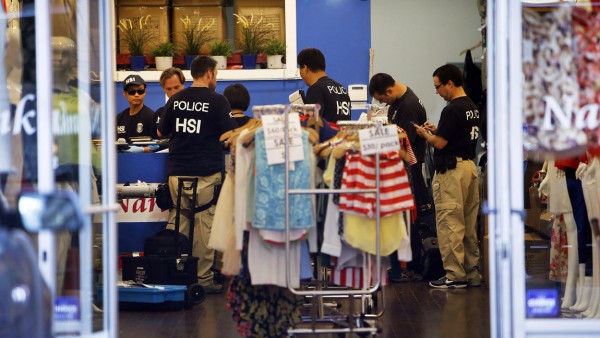by JAMES S. KIM
Kidnapping, ransom and money laundering. It sounds like something out of a movie or television show, but in reality, it was one of the eye-opening stories coming out of Los Angeles’s Fashion District last Wednesday as nearly 1,000 Immigration and Customs Enforcement Homeland Security agents and local law enforcement raided several businesses, according to the Los Angeles Times.
Aptly-titled “Operation Fashion Police,” the raid targeted businesses that were allegedly aiding cartels in getting money from drug sales into Mexico.
Q.T. Fashion owner Andrew Jong Hack Park, 56, of La Canada-Flintridge, business manager Sang Jun Park, 36, of La Crescenta were among those arrested on Wednesday on charges related to money laundering and smuggling goods.
While it was a perfectly functioning wholesaler of mostly maternity clothing, Q.T. Fashion also had dealings with the Sinaloa cartel in Mexico. The cartel was holding a drug distributor hostage, and his family approached Q.T. Fashion to be the broker and send $140,000 in ransom money. Through a series of financial moves, the money made its way into Mexico, and the indictment said that the victim was released the day Q.T. Fashion received the money.
It’s one of the more extreme examples of drug cartels utilizing businesses throughout L.A. to convert their earnings into pesos through “trade-based money laundering.”
“We have targeted money laundering activities in the Fashion District based on a wealth of information that numerous businesses there are engaged in Black Market Peso Exchange schemes,” said Robert E. Dugdale, the Assistant U.S. Attorney who oversees the Criminal Division in the Central District of California. “Los Angeles has become the epicenter of narco-dollar money laundering with couriers regularly bringing duffel bags and suitcases full of cash to many businesses.”
Those earnings were on full display last Wednesday: agents seized over $100 million (about two-thirds in bulk cash) from 75 different raids, most of them concentrated in the fashion district, and arrested nine people. Three L.A.-area homes were also seized on Friday, as they are suspected of being purchased with illicit money.

Photo via U.S. Attorney’s Office
Cartels have been unable to send shipments of cash back home since Mexico set limits on U.S. currency deposits at banks in 2010. Since then, cartels have increasingly arranged for drug dealers in L.A. to pay local businesses for merchandise that would be sent to a business in Mexico. That business would then sell the merchandise and pay a peso broker, who, after taking a cut, delivers the rest to the cartel.
Only four businesses were listed in the indictment: Q.T. Fashion, Yili Underwear, Gayima Underwear and Pacific Eurotex Corp. Authorities warned, however, that this was just the beginning.
“This is only the first round of cases,” said Thom Mrozek, the Public Affairs Officer for the Los Angeles District Office of the U.S. Attorney’s Office. “W believe there will be more, many more.”
The owners of Gayima Underwear and Yili Underwear, Xilin Chen, 55, and his son Chuang Feng Chen, 24, were arrested and charged with nine felony counts related to money laundering and structuring, as well as lying on naturalization forms. Xilin’s daughter, Alixia Chen, remains at large in China.
Four owners of Pacific Eurotex Corp. were arrested and charged with 10 felony counts. They were accused of hiding $2.6 million in drug money over two years by dividing it into 363 separate deposits, the L.A. Times reports.
A Maria Ferre employee was arrested on suspicion of distributing money and changing clothing tags to read “Made in America” to avoid Mexican tariffs. Three other Maria Ferre defendants are at large in Mexico.
Taiwanese law enforcement also froze a bank account containing nearly $16 million that is allegedly tied to a similar money laundering scheme by Mexican cartels.
As of Wednesday, seven of those arrested had pled not guilty. Two others are set to be arraigned at a later time.
Image via Los Angeles Times









